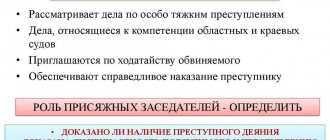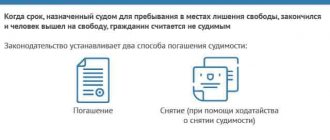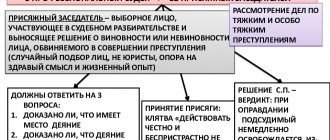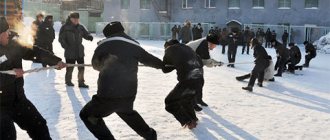Basic rights of convicted persons
February 4, 2018
If a person is sentenced to imprisonment, he is, of course, limited in some rights guaranteed by the Constitution of the Russian Federation, for example, the right to freedom of movement, however, even in places of deprivation of liberty, the convicted person has a number of rights specified in the Constitution of the Russian Federation, as well as in the Criminal Executive Code of the Russian Federation.
Thus, according to Article 10 of the Penal Code of the Russian Federation, the Russian Federation respects and protects the rights, freedoms and legitimate interests of convicts, ensures the legality of the use of means of correction, their legal protection and personal safety during the execution of sentences. Convicts are guaranteed the rights and freedoms of citizens of the Russian Federation with exceptions and restrictions established by criminal, penal and other legislation of the Russian Federation.
Article 12 of the Penal Code of the Russian Federation states that convicted persons have the right to receive information about their rights and obligations, the procedure and conditions for serving the type of sentence imposed by the court, and the administration is obliged to provide such information, as well as inform them of changes in the procedure and conditions for serving the sentence.
In disclosing the principle of protecting the dignity of the individual by the state, enshrined in Article 21 of the Constitution of the Russian Federation, Part 1 of Article 12 of the Penal Code of the Russian Federation indicates that convicted persons have the right to polite treatment by the staff of the institution executing the punishment. Convicts must not be subjected to cruel or degrading treatment or punishment.
In addition, convicts have the right to health care, medical and sanitary, specialized, as well as psychological assistance. Convicts, regardless of their consent, cannot be subjected to medical and other experiments that endanger their life and health (Part 3 of Article 12 of the Penal Code of the Russian Federation). This prohibition is absolute and must be strictly enforced.
The Penal Code of the Russian Federation enshrines the right of convicts to submit proposals, statements and complaints to the administration of the institution or body executing punishment, to higher management bodies of these structures, to the court, prosecutorial authorities, as well as to interstate bodies for the protection of human rights and freedoms.
The Penal Code of the Russian Federation establishes the right of convicted persons to use the services of lawyers, as well as other persons entitled to provide them. In addition, the Penal Code of the Russian Federation establishes the right of convicted persons to personal safety. If a threat to the personal safety of the convicted person arises, he has the right to apply to any official of the institution executing punishments in the form of forced labor, arrest or imprisonment, with a request to ensure personal safety. In this case, the specified official is obliged to immediately take measures to ensure the personal safety of the convicted person who has applied.
Article 14 of the Penal Code of the Russian Federation, as well as Article 28 of the Constitution of the Russian Federation, guarantees freedom of conscience and freedom of religion. Convicts have the right to profess any religion or not to profess any religion, to freely choose, have and disseminate religious beliefs and act in accordance with them. At the same time, the exercise of the right to freedom of conscience and freedom of religion should not violate the internal regulations of the institution executing the punishment, nor infringe the rights of other persons.
Prepared by the Ryazan Prosecutor's Office for Supervision
of Compliance with Laws in Correctional Institutions
Return to list
Consultation with a lawyer on protecting the rights of convicted persons
Our lawyers are engaged in protecting the rights of convicts after a sentence is passed and during the process of carrying it out.
We provide the following services:
- We advise on the rights of convicted persons;
- We offer methods of protection taking into account the specifics of the current situation;
- We study the materials of the criminal case;
- appeal the verdict through appeal, cassation and supervision;
- submit an application for compensation;
- We help restore housing, pension and labor rights to rehabilitated citizens;
- We are seeking a change in the type of correctional institution;
- We submit documents to reduce the severity of the punishment.
SKP company specialists have the necessary qualifications to solve all problems that arise while serving a sentence. If you need advice from a professional lawyer, fill out the feedback form or call. We will answer your questions at any convenient time.
Situation #1
The convict is released from prison before 1995 and does not live for a long time in the residential premises that he used before imprisonment.
Interesting for the analysis of this situation is the Appeal ruling of the Perm Regional Court dated March 12, 2012 No. 33 - 2002, according to which the decision of the first instance court was overturned, and a new decision was made in the case. The defendant was declared to have lost the right to use the residential premises and was subject to deregistration.
From the circumstances of the case it followed that the plaintiff filed a lawsuit against the defendant to declare that he had lost the right to use the residential premises - an apartment. In support of the claim, the plaintiff indicated that he is the owner of the said apartment. The defendant was registered at the place of residence in the disputed residential premises, and by a court verdict dated December 21, 1981, he was sentenced to 9 years in prison. The sentence was carried out on March 15, 1982 in connection with the entry into force of the judicial act and the transfer of the convicted person to prison.
After his release in 1990, the defendant did not move into the apartment; his place of residence is currently unknown. According to the plaintiff, the defendant has lost the right to use the disputed apartment, and therefore must be deregistered at the address indicated above.
The appellate instance noted that in accordance with paragraph 8 of Part 2 of Art. 60 of the RSFSR Housing Code, residential premises were reserved for temporarily absent citizens in cases of conviction to imprisonment for a term of more than six months, exile or deportation - until the sentence was carried out. The implementation of this provision, by virtue of clause 6 of the Resolution of the Constitutional Court of the Russian Federation of June 23, 1995 N 8-P, did not imply a mandatory judicial procedure for recognizing a person as having lost the right to use residential premises. Thus, in accordance with the provisions of the RSFSR Housing Code, the defendant lost the right to use residential premises. Moreover, the fact that it was not deregistered at the address has no legal significance. According to paragraph 31 of the Regulations on the Passport System in the USSR, approved by Resolution of the Council of Ministers of the USSR No. 677 of August 28, 1974, persons sentenced to imprisonment were discharged from the residential premises after the sentences against these persons entered into legal force. The fact that the defendant was not deregistered, as reasonably stated in the appeal, has no legal significance and does not indicate that the defendant retained the right to use the disputed residential premises after the execution of the sentence. In the future, the defendant, who did not retain the right to use the residential premises, could move in there only with the consent of the owner, as a family member, and not by virtue of any independent right. After his release from prison in 1990, the defendant did not move into the disputed apartment. It has not been possible to establish his whereabouts since 1990. In this regard, the transfer of the disputed apartment under the privatization agreement in 1993 to the defendant’s mother was carried out without obtaining the defendant’s consent, since the latter lost the right to use the residential premises due to the provisions of the RSFSR Housing Code. The appellate instance noted that the fact that by Decree of the Constitutional Court of the Russian Federation of June 23, 1995 No. 8-P, part 1 and clause 8, part 2 of Art. 60 of the RSFSR Housing Code was declared inconsistent with the Constitution of the Russian Federation and cannot affect the resolution of this dispute, since the said Resolution came into force from the moment of its proclamation and does not have retroactive force, as is expressly stated in the Resolution itself.
Important legal nuance
The appellate instance noted that the following circumstance is legally significant for this case: did the defendant again have the right to use the disputed apartment, since in order to acquire the right he had to be moved into the residential premises as a member of the tenant’s family? As the court found, and as follows from the case materials, after his release from prison in 1990, the defendant did not move into the apartment, therefore, he did not acquire the right to use it.
Thus, in addition to formal registration at the place of residence, the defendant had to actually move into the residential premises, that is, permanently reside in it; bear the costs of maintaining housing; together with the tenant and other family members, pay rent and utilities; store things belonging to him by right of ownership. Consequently, if, after his release from prison in 1990, the defendant had moved into the apartment, he would have acquired the right to use the residential premises and equal rights to privatize it together with his mother. This procedure could be carried out on the basis of the Regulations on the passport system in the USSR, approved by Resolution of the Council of Ministers of the USSR of August 28, 1974 N 677, only with the consent of the person who provided the living space for registration (clause 25 of the Regulations).
The Supreme Court clarified the admission of public defenders to the colony
According to the law, the court can, along with a lawyer, allow one public defender (often a relative of the defendant), who is not required to have a higher legal education (Article 49 of the Code of Criminal Procedure), to attend the trial. And such a defender will have all the rights of a professional lawyer in this proceeding, says a former senior investigator of the Ministry of Internal Affairs, and now a lawyer. Law Office "Thorn" Law Office "Thorn" Regional rating. Farhad Timoshin.
For admission to court
Former member of the Public Monitoring Commission (POC) of the Republic of Mordovia, Sergei Maryin, has been acting as a defender for local prisoners for several years. At the end of 2022, he wanted to go to the territory of Mordovian IK-10, where three of his clients were serving sentences under various articles. In statements addressed to the head of the colony, Maryin indicated that he was going to take powers of attorney from prisoners to file complaints with the ECHR. But he was not allowed to see the convicts, and the documents were returned without any notes from the head of IK-10 about the reasons for the refusal of visits.
Case No. 15-КГ18-9
Plaintiff: Sergey Maryin
Defendant: Correctional colony (IK-10) of the Republic of Mordovia
Court: Supreme Court
The essence of the dispute: Can a public defender without a higher legal education get a meeting with his clients in a colony?
Solution: Yes it can
Then the former member of the PMC challenged the actions of the FSIN employees in court (case No. 33a-828/2018). He presented the protocol decisions of the courts, which allowed him to be a defense lawyer in three trials. Despite this, two authorities in their refusal indicated that the plaintiff does not have a higher legal education, which means he cannot professionally provide qualified legal assistance. The courts emphasized that the convicts themselves did not ask for a meeting with Maryin. The first instance and the appeal added that the colony administration is not obliged to indicate the reason why it refuses such visits (Order of the Ministry of Justice of December 16, 2016 No. 295).
The public defender did not agree with such conclusions and appealed them to the Supreme Court (case No. 15-КГ18-9). The Supreme Court immediately noticed: in the case materials there is evidence that Maryin is the defender of the convicts with whom he sought to meet. This is confirmed by the protocol decisions of the courts. The judges of the Supreme Court also noted that for the controversial situation it does not matter whether the prisoners themselves asked for a meeting with the ex-member of the POC or not. The Judicial Collegium for Administrative Cases emphasized that in the case under consideration, the courts had to first determine whether Maryin was seeking a meeting to provide legal assistance to his clients or for something else. Taking into account the above, the trio of judges of the Supreme Court, chaired by Vladimir Khamenkov, canceled the acts of the lower authorities and sent the case for a new trial back to the court of first instance with a different composition (editor's note - not yet considered).
Pravo.ru experts: “The Armed Forces are fighting against bad practices”
The problem with accessing defense attorneys to clients who are in pre-trial detention centers and colonies has existed for several years. Four years ago, a draft law was submitted to the State Duma for consideration, which provided for the access of lawyers to clients. But until December 2016, parliamentarians did not have time to consider it. The bill was remembered only after FPA adviser Yuri Kostanov, during a meeting between Vladimir Putin and members of the Human Rights Council in December 2016, complained to the president that lawyers were still having difficulties visiting clients in pre-trial detention centers (see “Lawyers reminded the president about problems with admission to the pre-trial detention center"). After this, Putin himself initiated a similar bill, which was adopted in the spring of 2017. Among other things, the novellas eliminated the “terminological error” in Art. 49 Code of Criminal Procedure. Now the lawyer “enters” into a criminal case, rather than “allowed” to participate in it. This change enshrined at the legislative level the access of lawyers to clients.
Partner Romanov & Partners Law Firm Romanov & Partners Law Firm Federal rating. group Criminal Law Company profile Matvey Protasov recalls that back in 2016, the Constitutional Court indicated the obligation of FSIN employees to justify the refusal of a lawyer to meet with the accused (Determination No. 2358-O). The Constitutional Court then emphasized that such a refusal cannot be based solely on the lack of information about the participation of a lawyer in a specific criminal case. Moreover, the administration must independently find out information about this from the investigator. But, despite the clarifications of the Constitutional Court and the adopted “presidential amendments” to the Code of Criminal Procedure, difficulties with access to the pre-trial detention center for defenders still arise, Protasov admits. In some Russian regions, pre-trial detention center employees still require lawyers to obtain permission from the investigator and the court, but such a document is not enshrined in either the Criminal Procedure Code or other legal acts, notes Timoshin.
Until now, lawyers, planning to visit some pre-trial detention centers, are forced to insure themselves against the risk of not getting to their client with such “permissions” from investigators. They are not provided for by criminal procedure legislation, so defense attorneys present them only as a last resort.
Dmitry Soldatkin, managing partner of MCA Soldatkin, Green and Partners (SZP Law) MCA Soldatkin, Green and Partners (SZP Law) Federal rating. group Family and inheritance law group Labor and migration law (including disputes) group Criminal law
But problems with seeing a lawyer occur not only when the principal is in custody. Sometimes a citizen is deprived of the opportunity to contact a lawyer during a search, says lawyer Alexey Serdyuk from Knyazev and Partners Knyazev and Partners Federal Rating. group Criminal law Company profile. To do this, it is enough for the investigator to obtain a search warrant with a note of familiarization. After this, law enforcement officers report that the investigative event has begun, and all those present until its end are prohibited from communicating with each other and other persons, including contacting lawyers, the lawyer explains: “Of course, such a restriction is illegal, since his participation is directly provided for in Art. 182 of the Code of Criminal Procedure (“Grounds and procedure for conducting a search”). So, in order to avoid such situations, Serdyuk recommends first contacting a lawyer, and only then getting acquainted with the search warrant and putting the appropriate mark in it.
Taking into account all the listed difficulties, Protasov welcomes the decision of the Supreme Court under discussion: “It demonstrates the effectiveness of judicial appeal of decisions of officials that clearly contradict the opinion of judges.” The conclusions of the Supreme Court will ideally stop the vicious practice of non-admission or at least serve as a stable guideline for lower courts, which sometimes still take the side of FSIN employees.
- Alexey Malakhovsky
- Supreme Court of the Russian Federation
- criminal process







